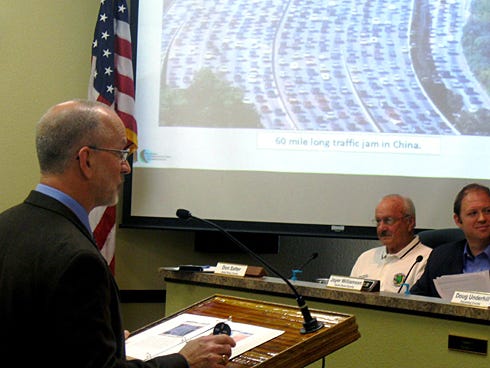
CRESTVIEW — The 8-mile drive through Crestview on State Road 85 could cost drivers as much as 48 cents if Florida follows Oregon’s lead and implements a mileage-based user fee to fund road maintenance and construction.
Two bills currently in the state Legislature include funding to study implementation of such a fee in Florida.
That’s because the current primary funding source, gasoline taxes, is unsustainable, Florida Transportation Commission assistant executive director Mark Reichert said.
Though there are more cars on the road, revenue from state and local gas taxes continues to decline because drivers are driving more fuel-efficient vehicles less.
Plus, Reichert said while speaking to the Northwest Florida Regional Transportation Planning Organization, more electric vehicles are essentially getting free trips by paying no gas taxes.
He likened this to stealing a neighbor’s cable TV service.
“You’re taking full advantage of the utility but you’re not paying for it,” Reichert said.
A FEE IN OREGON
The TPO, meeting in Crestview on Monday, heard Reichert’s description of a new Oregon user fee beginning July 1. Several other Western states are also considering the fee, he said.
Florida leaders are already in discussion with other Southern states about the potential for implementing a road user tax in the region, Reichert said.
The tax would be levied based on the distance a motorist drives. Monitoring devices in vehicles could tally trips on tax district roads, though, Reichert said, would shut off when the car drives over a state line or onto a private road.
“You only pay for those miles you actually drive,” he said.
UNPOPULAR TAX
He noted the fee is, understandably, unpopular among many drivers.
“A lot of people have issues about being tracked by the government,” he said, but already drivers are monitored by traffic cameras and other technology.
“If you have a smartphone, you can be tracked,” he said.
To ease their concerns, monitoring motorists’ mileage is conducted by private contractors. In addition, drivers can opt out of paying mileage-based fees and pay an annual flat fee.
“But it’s expensive,” Reichert said, saying it averages about 6 cents per mile, as compared to the approximately 2.5 cents per mile currently paid in Florida in gas taxes, license, tag and registration fees.
FAIR FUNDING METHOD
Unpopular as the fee is, Reichert said “it seems to be the fairest method” because it targets everyone who drives in the state, including visitors and drivers passing through to another state.
“We spend more on cable TV and cell phone bills than we do on the utility we use most and that drives our economy,” he said. “Obviously, continuing to rely on the fuel tax will not close the funding gap.”
However, he said, “The Florida Transportation Commission does not support a mileage-based user fee at this time.”
It would take several years for such a fee be implemented, Reichert said, but the state is wise to consider its options now.
“Most states are facing a crisis today,” Reichert said. “Our crisis is a little bit farther down the road.”
BY THE NUMBERS
Florida motorists pay these gasoline taxes:
•18.4 cents: federal highway tax (plus 6 cents more for Diesel)
•13.3 cents: state highway tax (adjustable to inflation)
•7.3 cents: enhanced state tax (adjustable to inflation)
•2 cents: constitutional fuel tax (set in 1943)
•1 cent: state-collected county fuel tax (set in 1941)
•1 cent: state-collected municipal fuel tax (set in 1971)
•1-6 cents: county optional fuel tax (6 cents for Diesel)
•1 cent: “ninth tax”
•Up to 12 cents: local option tax (10 cents in Okaloosa County)
Source: Florida Transportation Commission assistant executive director Mark Reichert
Email News Bulletin Staff Writer Brian Hughes, follow him on Twitter or call 850-682-6524.
This article originally appeared on Crestview News Bulletin: Here's why you could pay for using Florida roads
